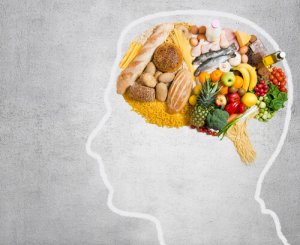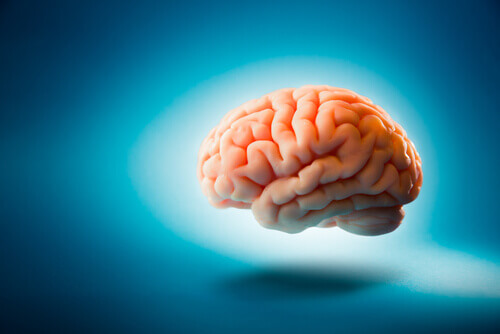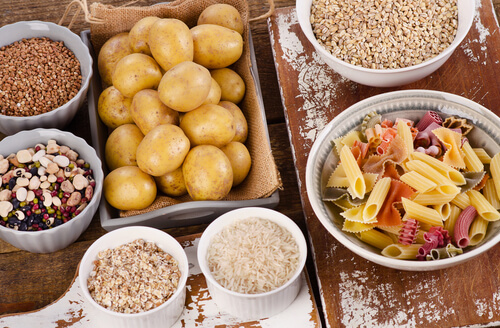Your Brain Will Thank You for Eating Healthy

The greatest link between your body and the food you eat is not your digestive system, but your brain. Your diet directly affects it. On the one hand, it’s responsible for hunger, satiety and the desire to eat, and on the other it obtains its energy from food.
For your brain to function optimally, you must nourish it correctly. Depending on what we eat, a series of metabolic processes will take place that will transform those nutrients into the fuel your mind needs.
Where does the brain get its energy?
The brain doesn’t rest. It is continuously active and functioning, even when you’re not aware of it. That’s why nutrition is so important, because the only way to give your brain energy is by eating a variety of foods.
Carbohydrates helps the brain to be the most efficient it can be. And among the types of carbohydrates, sugar or sucrose is the most important for optimal brain function. Yes, sugar isn’t all bad.

Sugar is soluble in water and easily digestible by the body. Chemically, it is a disaccharide formed by two molecules: one of glucose and another of fructose. Both are commonly considered the two main types of sugar.
However, glucose and fructose have opposite effects on your brain. The former activates the satiety signal. Fructose performs the opposite task, activating the cerebral pathways that increase your interest in food. One lessens and the other stimulates the desire to continue gobbling up food. Interesting, right?
Glucose is the brain’s favorite food
But between both types of sugar, the brain has a favorite: glucose. It is your cells’ “favorite food” and your brain’s main energy source. It’s essential.
In fact, despite the fact that the weight of the brain is only 2% of your total body weight, it requires almost a fifth of the total glucose circulating in your blood. In addition, it demands 10 times more blood than muscle tissue. Why? Unlike muscles and other organs, the brain cannot store glucose for later use.
On top of this, the brain has another handicap: its cells are not capable of transforming fats or proteins into glucose. It can only use what comes from our daily intake of sugar.
Maybe now you understand better that eating healthy is a decision that affects you beyond just your weight. Some foods rich in glucose are vegetables (carrots, beets), dairy products, grains (corn, wheat, brown rice) and white bread.
Too much or too little is harmful
But beware! Just because sugar is necessary for your brain to work properly doesn’t mean that you should stuff yourself with pastries and junk food. Remember that sugar is naturally present in the food you eat daily and that amount is enough.
Too high or too low levels of glucose keep the body from functioning normally. If your blood sugar is low, like when your diet is too restrictive, it can weaken your memory, concentration and learning. If it’s high, chronic diseases can result, like epilepsy.
Other foods that are good for your brain
Starch is another type of complex carbohydrate formed by glucose molecules, and it’s very useful for good brain function. Therefore, it is essential to also have starchy foods in your diet like potatoes, rice and pasta.

Proteins are essential for the production of neurotransmitters. These, in turn, are responsible for the flow of information between the brain and the rest of the body. Examples of good protein sources are fish (tuna, sardines, salmon), meat and eggs.
Nuts boost blood circulation and oxygen distribution throughout the body. In addition, nuts are antioxidant-packed and anti-inflammatory due to their high content of omega 3 fatty acids, vitamins and minerals.
How are foods transformed into energy for the brain?
When we eat, the enzymes in our digestive system break food down into different parts. Carbohydrates are broken down into simple sugars, proteins are divided into amino acids and fats into fatty acids.
These compounds travel through the bloodstream to the different cells that make up the human body. Some, like glucose, go directly to the blood vessels of the brain. Others, such as fatty acids, are structural elements for cell membranes.
Habits that harm brain function
Not having breakfast means less nutrition for the brain, and worse functioning early in the morning. In the same way, consuming too little or too much sugar at once affects your brain’s power.
Lack of physical exercise or sleep, smoking, drinking or using other drugs can even change the structure of the brain since they seriously affect the central nervous system. Few good friendships, violence and stress also diminish mental capacity.

We don’t become more or less intelligent depending on our diet. But it does influence our mental performance and effectiveness on a day-to-day basis. We have already seen that although glucose is the foundation, the best way to ensure that our brain is being fully nourished is to eat a healthy, balanced diet.
By introducing small changes in the diet you might see surprising results in everyday tasks, such as math, reasoning and memory. Why don’t you try it?
This text is provided for informational purposes only and does not replace consultation with a professional. If in doubt, consult your specialist.








